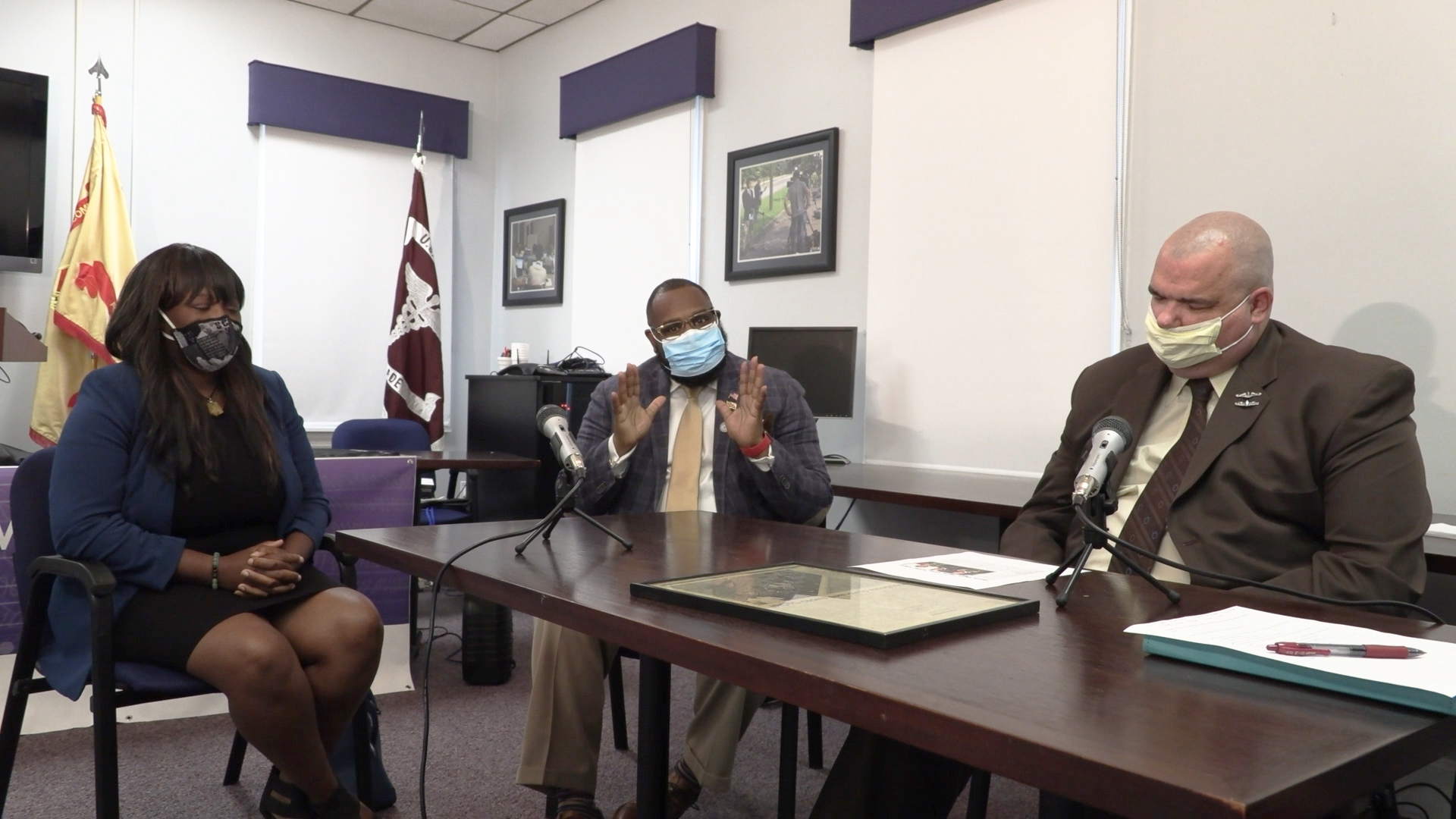By Maya Jordan, Fort Meade Public Affairs

Former cadets under Col. Frank J. Preston's tutelage discuss Preston's influence on their lives -- from left, Dr. LaKendra Schwendig, Ray Emmanuel and Brian Lewis . (Photo by Bryan Spann)
Remembering the life, legacy and leadership of Meade High School JROTC leader Col. (Ret.) Frank J. Preston
It was in the mid-to-late 1990s that teenagers LaKendra Schwendig, Ray Emmauel and Brian Lewis earned their stripes as senior leadership cadets as members of Meade High School’s prestigious Junior Reserve Officers’ Training Corps. The JROTC program was under the tutelage of Col. (Ret.) Frank J. Preston at the time. Earlier this week, Preston died. He was 85.
Schwendig, Emmanuel and Lewis agreed that Preston was an amazing champion who could not be described in three words. But he was the embodiment of the 14 JROTC leadership traits they had learned nearly 20 years ago including but not limited to dependability, enthusiasm, endurance, integrity, judgement, justice, courage and unselfishness.
It was June 2013, he retired from his role leading the youth in JROTC at Meade High after 23 years as the senior Army instructor.
Prior to serving as an instructor, Preston was an Army Reserve officer. He worked for First Army at Fort George G. Meade for four months in 1979 and returned to the installation two years later. He retired from the Reserves in 1987.
“Col. Preston was a mentor and father-figure to a lot of us who didn’t have fathers or had fathers and needed a different role model,” said Brian Lewis, a military affairs attorney in Minnesota.
The former students reflected on how Preston made a significant impact in their formative years that transcended into adult life.
Dr. LaKendra Schwendig, a victim’s advocate for the state of Maryland recalls when Preston had to be a disciplinarian.
“At the time I met Col. Preston, I was wild and unruly. My mother had just passed,” said Schwendig.
“And I did not want to do my part as a student. I did not want to do my part as an individual. Col. Preston challenged me every step of the way. I remember him telling me, specifically ‘[you] have a commanding presence but you need to [do] something for others’, and not just focus on yourself.
“He called me out on being selfish and when you’re young you don’t really understand [at] that time. But [in] hindsight, everything I did from the age of 16 on by way of community work was because of the things he talked to me about. I definitely credit him for opening my eyes and checking me to make sure that I checked myself.”
It was important to Preston that he and his former cadets kept in touch.
“It was almost a demand that Col. Preston kept close [communication] with all of his [JROTC cadet] commanders and other cadets that really stood out,” said Ray Emmanuel, IT Business developer for the state of Maryland.
“His vision for keeping us interconnected was [realized] in an organization called the Fort Meade JROTC Alumni Foundation,” Emmanuel continued. “It was formed to not only help us stay connected to one another but his vision was for us to invest into an organization that all cadets could benefit from.”
Oftentimes, JROTC alumni would come to his classes to inspire and motivate the next generation of cadets.
His classes provided an opportunity to learn about a myriad of topics from financial literacy to the importance of family. He would often take his cadets on field trips to universities, the Naval Academy and West Point.
“[JROTC] was not like going to another class,” said Schwendig. “We always looked out for each other. We always supported each other. He would always use the classroom time and after to mentor his cadets.
“Col. Preston’s legacy lives in each and every one of us. Everything we have done and will do. It's attributed to the things we learned with our time [spent] with him. And that is something that never goes away.”
He cared about the community and was very active in ensuring cadets supported Fort Meade events on the installation.
“Col. Preston’s legacy will live on through the halls of Meade [High] probably forever,” said Lewis. “His legacy will endure around the post because the post community got used to seeing his cadets come out and serve this post.”
Preston had an impeccable sphere of influence in the lives’ of many present day leaders within the military and out.
The former cadets explained why mentorship is a necessity for individual growth throughout life.
“In order to be the type of leader you need to become someone has to be there to water the seed,” said Emmanuel. “And throughout my [academic] years – even post graduate – with Col. Preston, he was there to provide that water [and] encouragement.
“Almost like a compass, mentors help you find true North,” said Emmanuel. “That’s why you need a mentor. In different fields of human endeavor, you have to have mentors. We all need them. Whoever you aspire to be like, get connected to those people and let those people pour into you so that you can produce. Everything is designed to reproduce. Col. Preston made sure he reduplicated himself in us and in the JROTC program.”
Lewis said, “I issue a challenge to every leader on this base to take the Preston promise, go out there and identify the person struggling in formations. Help them. Mentor them. Give back to your formations. Give back to the post.”





